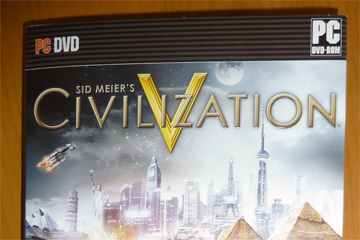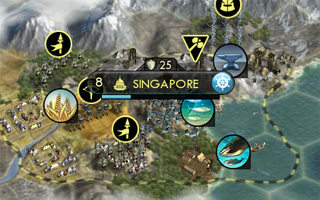|
|
Monday, Oct 11, 2010 - 01:28 SGT
Posted By: Gilbert
|
- gaming -
Ten Ten Ten

I'll get my hat...
(Source: naruto-uzumaki.wbs.cz)
This happens to be the tenth such "special" date of the past decade. Just two more of these to go till 2101, however, so those wanting a memorable anniversary for whatever they have in mind had better hurry. (N.B. it should be very meaningful for computer science folks [who are readers of Adams] - care to venture why?)
Ms & Ms Robos

Run, robos, run!
The two roborovskis officially passed the one million revolution mark on their main wheel sometime on October 5 (995353 just after midnight, and 1011557 just before), at an average pace of 26346 rounds per day. Well done my small and furry friends!
In the process, they figured out how to explore the entirety of their half of their PC, and can now scoot from the bottommost of the three floors available to them back to the safety of the top level in less than one second (this was observed after one of the robos discovered Mr. Ham J. D. Burger trying to stick his muzzle through).
Today appears as auspicious a day as any to name the tiny furballs, so I present...

Introducing the newest employees of this blog

I would complain, but I'm too knackered to do so
The hamsters are developing their own personalities. Unfortunately, none of them are eating out of their own cheek pouches in my hand like the dearly departed Mr. Ham G. Bacon, or even staying in my hand (I'm looking at you two, Ms. Robos).
Ms. Robo W. White appears to be the more dominant of the pair, and can shield honey stars with a nimbleness that puts most footballers to shame. She hasn't quite gotten the knack of climbing to the attic like Ms. Robo G. Grey, who was the more active of the two when they first arrived. Kinda like my first two, actually.
The new Mr. Ham, on the contrary, is much more polite than the original, and doesn't grab and stuff his face with as much food as possible, instead usually biting whatever he's given and transporting it to his food dish - perhaps this is because he's a solo hamster, and has no need to hoard his goodies? He's also kind of a delicate soul, and has the quaint habit of padding his butt with bedding before settling down to sleep.
Alright, enough about the squeezable ones already. Next topic:

I wonder what this is...

Oh, my!
CiV
This is the first software title I have preordered in my entire life, simply because I have probably spent more time on Civ III (all those long NS weekends) and Civ IV than any other game title (well, maybe DotA). After I got wind of a local online retailer that offered free delivery, there was nothing that could have stopped my debit card making an entrance.
It took even more force of will for me to ignore the temptation as I cleared my reports and projects (and I wasn't completely successful, but at least Java RMI turned out to be easy to understand), but I got over those hurdles (for now), and it was time for CiV bliss. Here's the lowdown:
The Good
- Guess which civilization officially made its debut? (okay, as an unplayable city-state, but still...)

- Hexagons replace squares as the tile unit. Makes for more natural landmasses and balanced movement
- No need to spam roads as in previous versions (where roads/railroads offered many tiles an income/production bonus), and in fact laying roads everywhere is generally a bad idea due to maintenance costs. Players now have to decide whether the roads beyond the minimum required for trade are worth it - less micro, more thinking, good!
- Culture now expands organically tile-by-tile, engulfing more habitable spots first, and doesn't suddenly explode around a city's perimeter once a certain threshold is reached; additional tiles may be bought, simulating planned settlement
- All land units can embark into (defenceless) boats and cross oceans once the appropriate technology is researched. Not the most realistic, but removes the headache of arranging transports for every last worker. Of course, if barbarian vessels are around, they had better still have a military ship as escort...
- Some city improvements now require specific terrain features. We had this in previous Civs (e.g. only riverside cities could have levees, and obviously only coastal cities could have harbours), but now mountains are required for observatories (and Maccu Pichu), deserts for solar plants and flat ground for windmills. Oh, and jungles contribute extra scientific research. Far better than when certain terrain was nearly always useless...
- Strategic resources are now consumed. In the past, a single iron mine could arm umpteen swordsman units, and any old coal mine could supply an entire empire's factories. Well, no longer. This makes sense, and makes additional sources of these resources particularly meaningful
- Natural wonders make an appearance! See Krakatoa, Mount Fuji, the Great Barrier Reef, etc. Shame they all provide the same benefits (two hammers and three gold) though
- National wonders no longer limited to two per city, but some now require every city in the empire to have a certain building, serving as a soft cap benefiting builders as opposed to warmongers and wild expansionists
- No corruption mechanic that increases with distance to the capital city (more of a personal preference than anything)
- No technology trading or brokering. Although I didn't mind it, it smacked too much of taking advantage of the A.I. (buy a tech, and trade it about to everybody else for much moolah - not that CiV's A.I. is particularly good, as we shall see)
- Instead, research pacts were introduced, which require an initial gold investment and gives both parties a new technology after 30 turns, which adds a layer of strategy in who to pact with (N.B. the pact concludes successfully anytime war is initiated between the parties, which is potentially very abusable)
- Pillaged improvements can be repaired instead of having to be rebuilt from scratch, a nice touch
- Cities now have a bombard attack and independent hit-points, avoiding them from falling to a single lousy barbarian unless the player keeps a garrison in every little city. Also makes the decision of whether to use one's first warrior to scout a less risky affair, as it prevents cheesy defeats (Oh look, an unoccupied capital! Don't mind if I take it)
- Steam achievements, which give something to shoot for. They should give really in-progress details (e.g. how many more temples to the 1000 temple achievement?). Even Mafia Wars does that...
The Divided
- CiV now allows only one unit (ok, two units, if one is military and the other a worker) per tile (a.k.a 1UPT). While this eliminates the dominant Stack of Doom (SoD) tactic where one (sometimes several) huge army of countless units just visits one enemy city after another until they all fall, and rewards tactical positioning (no more clumping of at least one of each type of unit in an army, so that it has no real weaknesses), it also clogs the map in short order (resulting in the Carpet of Doom at higher difficulty levels, where the A.I. literally has one unit on each tile of the continent). Good idea, needs work
- The attitude of the A.I. is no longer presented in numerical terms, making diplomacy much more opaque (however, it's not too hard to tell whether they're friendly or less than happy with you, IMHO). This is probably more realistic, but can get irritating when apparently nothing you do (short of gifting cities) can make them like you, if you are perceived to be weaker militarily and they border you. Then again, that's quite realistic too...
- Civics have been replaced by permanent, incremental social policies. This removes micromanagement of civic benefits in the later part of the game, replacing it with some hard decisions in the earlier part. I initially disliked this change, but am beginning to see the design logic behind it
- Scout/warrior movement is now inverted, in that scouts ignore terrain penalties and can always move two tiles, while warriors can move two tiles only on open terrain. Compare with Civ IV, where scouts could move two tiles but only in open terrain, while warriors could only ever move one tile, and thus were better served sticking to rough terrain if used for scouting. More an observation than anything, since both models make sense
- Great people now construct structures on terrain instead of in cities. I disliked this too, but was more accepting when I realised that the effective city radius is much larger in CiV than Civ IV, and it is very rare for all tiles to be worked
- Slow development of lazy hamlets into bustling towns replaced by a constant +2 gold trading post. This however reduces the penalty for being randomly pillaged by unreasonable neighbours, so at least it has something going for it
- Longbows have a range of a couple of tiles (historically they had an effective range of a few hundred metres), while infantry are melee (fix bayonets [abandoned by the U.S. army] and charge?) I understand it's for tactical reasons, but it still feels strange
- No more wild animals. While they were a pain, they did add some flavour
- No more random events. Supposedly, many players didn't like them. Well, I did
- No more health as a game mechanic. An okay simplification that however makes the difference between corn and bananas and fish etc mostly cosmetic
- No more rushing wonders with population (through slavery) or gold. While this might make it fairer, having the option shouldn't be too gamebreaking, especially as the sacrifice was always pretty large
- No more culture flipping of cities, or even tiles (other than through a Great Artist culture bomb). I always rather enjoyed non-violent takeovers, now no longer possible
- No more revealing the entire world on researching Satellites. Kind of annoying - what are satellites good for anyway?
- No more religion, corporations, espionage, vassal states... you get the idea. They're probably going to add some of these back in an expansion pack and charge us for the privilege (not that I would mind that much, if they execute the concepts well)
- Wonder movies replaced by static (admittedly pretty) paintings. Alright, I guess
- Strangely, land units can generally move faster in the ocean than on land. Just saying. Also, the A.I. has no idea of how to utilize this to their advantage, which brings us to...
- Ram Khamhaeng the Great of Siam bears more than a slight resemblance to Thaksin Shinawatra, which ruffled some feathers. Again, just sayin'

(Source: 2kgames forums)
The Ugly
- The A.I. is plainly dumb, period. Decades of experience on a famous strategy game series, and they still can't keep A.I.'s from doing very silly things, and instead try to create a challenge by allowing the A.I. to "cheat" by getting bonuses. Granted, writing good A.I. is not easy - but what just about sums it up is a city-state requesting a road to their capital, then parking a military unit on the only tile into their peninsula, so that no worker can enter. *Claps*
- Happiness is now civilization-wide instead of city-specific. Whereas in Civ IV almost every newly-founded city could grow to a respectable size after a player had amassed sufficient luxury resources, in CiV your new whaling outpost in the tundra can cause general unhappiness throughout the empire, and once they get unhappy enough, none of the cities will grow, and even the army gets demoralised. Also, this happens at a threshold of -10 happiness, meaning that if the empire is hopelessly unhappy anyway, there's no reason not to just heck it and try and conquer everything in sight. I would have listed this under The Divided if the unhappiness penalty was at least on a sliding scale
- The minimap is neither nice nor useful, and the game tends to pan around slowly. Granted, Civ IV slows down in the later stages too
- Outright bugs, such as resources not being regained after trade pacts end, and end of peace treaty messages continually reappearing. At least the developers seem to be slowly ironing these problems out, as the issue with city-states not giving better deals for gifting more gold at once has been resolved
- Blatant exploits like gifting badly-wounded units to city-states if they are in a hopeless position, in which case they magically teleport away, denying enemy troops experience points. Strangely, a gifted unit that is already within the boundary of a city-state takes the same time to arrive, as a unit that was fighting half the globe away
- Presentational issues, such as the marble bonus for wonder-building not documented (other than a very brief pop-up), the gold rebate on Mughal forts not stated, and little things like not saying which city the survivors from ancient ruins join, to name but three
- Workers can't stack, and there is no concept of moving a military unit-plus-worker stack. Come on...
- And where's the end-game summary and replay? Please, even Civ III had that...
Next: Best Foot, Forward
Related Posts:
|
 |














